#david lloyd glasgow
Explore tagged Tumblr posts
Text
David Tennant's Plays: An Experienced Woman Gives Advice (1995)
I haven't done a thread on any of David's plays in a while, so I had some time yesterday to rustle one up about his 1995 play, An Experienced Woman Gives Advice. It premiered 28 years ago yesterday (which was why I chose to do a deeper dive about it) so let's get into it! An Experienced Woman Gives Advice (I'll use EW to refer to the play from here on out because what a long title!) would be David's first time performing onstage at the Royal Exchange Theatre in Manchester.
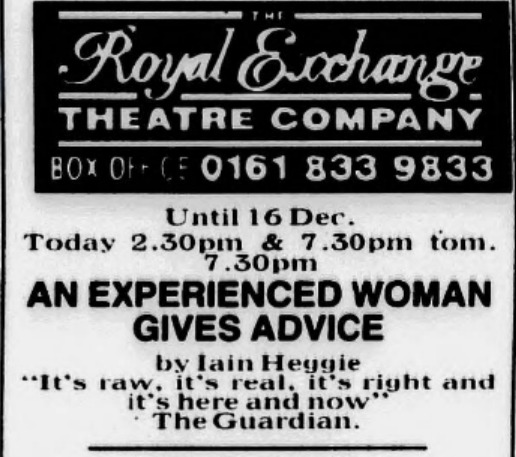


Prior to winning his role in EW, the last play David had done was What The Butler Saw as Nicholas Beckett, a role he was warmly praised for. What The Butler Saw ran for two months at five different venues around England before closing its run at the Nottingham Theatre Royal in late May 1995.
EW's playwright, Iain Heggie, had seen phenomenal success with his 1987 tour-de-force, A Wholly Healthy Glasgow. But in the years afterwards, Heggie had produced only a few more plays before deciding he'd rather go back to teaching and let his writing commence at its own pace.
Originally written as a miniature sex comedy, EW was long in development, and received further script development workshops at the Royal Scottish Academy of Music and Drama in Glasgow in 1992, and at the Traverse Theatre in Edinburgh in 1993.
Its world premiere would see Heggie's return to the stage.
Initially, it might have seemed odd that EW - with its Glasgow setting, Scottish writer, and fully Scottish cast - didn't make its debut in Scotland. But because Heggie and the Royal Exchange had similar actor-centered outlooks and many of the artistic directors in Scotland preferred a more visual style, Heggie chose to work with the Royal Exchange (who liked his work anyway) and the play made its debut in Manchester.
Previews for EW began at the Royal Exchange Manchester on 21 November 1995, with an opening day of 23 November 1995. It had a small cast of five: Siobhan Redmond as Bella, David Tennant as Kenny, Jenny McCrindle as Nancy, Alastair Galbraith as Irving, and Alexander Morton as Stick. It was directed by Matthew Lloyd, and its assistant director was Marianne Elliott.
The set, which was designed by Laurie Dennett, was quite sparse - a communal back garden and garden shed of a block of Glasgow tenement flats. The music was composed by Paddy Cunneen, who fans will recognize from many other projects he did with David, some of which I've previously done deep dives into (like Sunburst Finish, The Pillowman and Bite).
The three-act play had a runtime of 3 hours and 20 minutes, with two intervals - one 15 minutes in length, the other 10 minutes in length. It closed its run on 16 December 1995. Tickets were priced from £5.50 to £18, with matinees on Wednesdays and Saturdays.

The action takes place on two Sunday mornings and opens with Bella, who's a 39 year old teacher, gardening in her back garden. We learn she's in a three-year long relationship with a live-in toyboy lover, Kenny (DT) who's a former pupil and 15 years younger than her. And that he didn't come home the previous night.
Bella calls Kenny her "charming, fallible boy", and she treats him like one. Former lovers say he's "tall, kind of blond, with a lovely lean build" and "incredibly rich brown eyes." There’s "just no resisting him,” and he's "bastardly good looking.”

David in rehearsals as Kenny (from program of An Experienced Woman Gives Advice)
In a series of interruptions from people passing into the garden, Bella (Redmond) dispenses advice to the inquiring strangers Nancy and Irving (Galbraith), and learns Kenny spent the night with another woman...from the woman herself, Nancy (McCrindle), who doesn't realize who she's told. What Bella does with this information - and how her meticulously cultivated freedom of choice lifestyle shatters, especially given her first love, Stick (Morton) lives nearby - is what the rest of the play explores. We see love, lust, and lies play out as Bella makes her choices.
And there's a scene with Bella and Kenny...and sex behind the doors of a rocking, exploding garden shed!
I haven't been able to locate a production script of the play to see whether this scene was enacted onstage, but Heggie's published script book says this scene, where Bella strips Kenny of his clothes piece by piece before they go into the shed to have sex offstage, had some brief nudity. None of the play reviews I've been able to find mention any nudity, though one article about the play does state that due to "strong language and the sexual nature of the story, the play is not suitable for children under 15." (I don't know how much weight I should give this particular article, however, because it also calls the lead character "Maggie" rather than "Bella"!) Anyway, if this scene was included in the play, it would be the second known instance (the first being that now-infamous What The Butler Saw full frontal nude photograph) where DT was onstage in the buff!
Speaking of reviews, they were wildly different - some found it hilariously funny with barbed, sharp dialogue, while others found it fatiguing. David's "able portrayal" as Kenny was praised as part of an extremely talented cast, and his was called a "great performance".
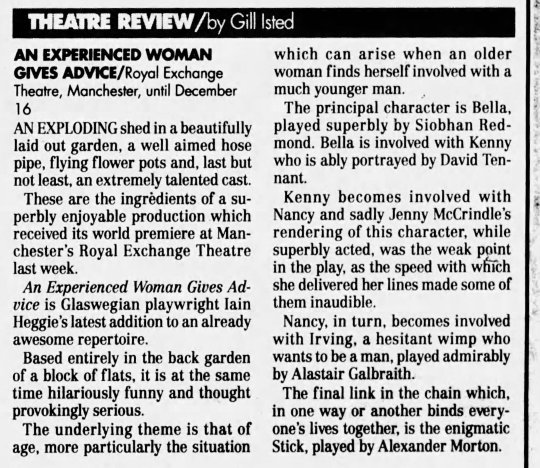

David and Siobhan Redmond earned Manchester Evening News Theatre Awards (MENTA) nominations - Redmond for Best Actress, and David for Best Actor in a Supporting Role. They also earned British Regional Theatre Awards nominations; Redmond for Best Actress and David for Best Actor. The play itself was also awarded a MENTA nomination for Best New Play. Redmond won both her nominations; David and the play didn't.
Photos from the play are almost nonexistent. I haven't located any images housed in any archives anywhere...so far. That doesn't mean they're not out there, mind you, just I haven't found them yet! I did manage to find a few of horrible quality while digging around in newspaper archives (I'll refrain from venting here about the quality aspects of digitizing newspapers, as that's a rant for another day) but it's a damned shame. I mean, in one of these, David just looks like a David-shaped black hole with floating arms! Nevertheless, I'll leave them here.
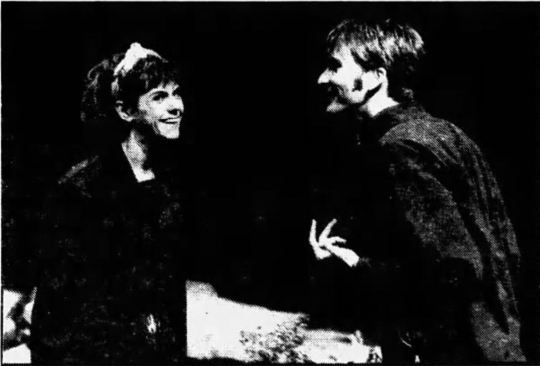
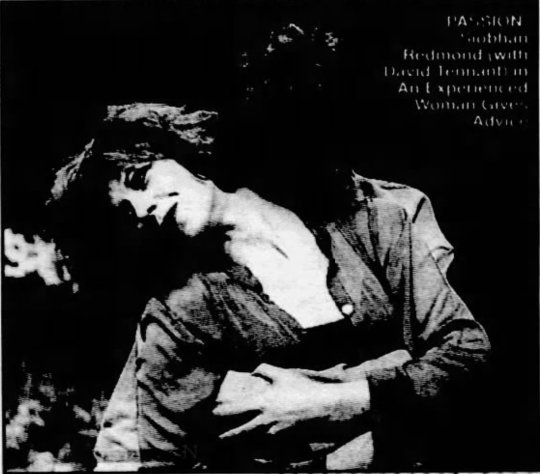
Something else I found fascinating during my research was that, like many venues, the Royal Exchange had a tradition of scheduling at least one informal discussion with the director and members of the company for each of their productions. While I didn't find any information on whether a discussion of this sort occurred during EW's run, I have to assume it did. Ah, to be a fly on the wall for that!
And that, my friends, is pretty much the story of An Experienced Woman Gives Advice! I wish I knew much more about this play, but like many parts of David's theatre career, wide gaps in our knowledge remain. But I keep on looking.
Thanks for reading!
#DavidTennant#ObscureDavidTennantPerformances#DavidTennantEarlyTheatre#AnExperiencedWomanGivesAdvice
24 notes
·
View notes
Text

This is a photograph of a 1918 war bond campaign, with the tank publicizing bond fundraising for the British war effort of the First World War.
It is indeed in Glasgow, Scotland, but it is often misrepresented as being part of the Red Clydeside labor strikes of 1919, with blame for the tank's presence variously attributed to Winston Churchill or to David Lloyd George, but if you look closely at the photo, the gathered crowd is far more curious about than fearful of the tank, which one would hardly expect it if had been deployed against them.
Actual photographs of the Red Clydeside labor and rent strikes of the 1910's, while perhaps of some historical interest, are too mundane, too predictably like ordinary protests, that this lesser-known war bond drive fits better with my blog, ironically.
0 notes
Text
belated tuesday new release news
(i had the *worst* migraine yesterday and had to work a long shift so i was dead by the time i got home)
louse erdrich the mighty red
patterson's (and david ellis) lies he told me
'danielle steel' released triangle
society of lies by lauren ling brown
the mistletoe mystery a pocket story from the maid author nita prose
for horror buffs the last one at the wedding by jason rekulak
third realm karl ove knausgard
rupi kaur's milk & honey special collector's edition
the wild huntress by emily lloyd-jones
song to drown rivers by ann liang joins the fancy sprayed edges gang
city in glass by nghi vo
also a fancy edges version of emily henry's beach read
fang fiction by kate stayman-london
frieda mcfadden thriller the boyfriend
john scalzi's starter villain is out in paperback
in ya releases:
kathleen glasgow the glass girl
the heir by sabaa tahir, newest in the ember in the ashes series (new covers now in box set!)
catherine doyle's the dagger and the flame
lynne painter hardcover nothing like the movies
lauren roberts powerless + reckless box set
and volume seven of the lore olympus graphic novel series
* also, to tie in with the new maguire book elphie due out this month, all the new merch for the wicked movie is out so if you love the show/book or just pink and green there's so. much.
** plus the wicked lego sets and holiday legos are out! (i predict the poinsettia set will sell out fast)
in final fiction notes: sally roberts' intermezzo is selling out fast and the publisher is dragging their feet on printing more of the fancy trending cover just fyi
dan jones big new history tome henry v
ta nehisi coates' the message
malcolm gladwell revisits his bestselling idea with revenge of the tipping point
ina garten the barefoot contessa has a memoir out be ready when the luck happens
and dolly parton and her sister have a new cookbook good lookin' cookin'
a bunch of kids new releases also came out but the main one where i am is the last dragon on mars by scott reintgen, which going up against british import juggernaut impossible creatures
(note: my personal most looked-forward-to title of the month? villain. the sequel to hench by natalie zina walschots. i can't wait)
OH! OHHHH ! i can't believe i almost forgot to mention:

seven seas paid that horror show daemi for the rights to publish kp and the first volume is out in stores!!
idk whether to be pleased: art is nice! promo for my beloved characters! or to be upset: bad writing! money for a nightmare author!
(i mean .. i read the online translation that was running on wattpad (not good) and heard from some folks who bought the books from overseas and the consensus was that it was not well-written at all, but i have not read through this new version so maybe they got a better translator? new editor? who knows? i will have to check and see)
all i have to say is that if you do buy this, you should be obligated to go and watch or re-watch the show
#new release tuesday#i feel like maybe should i put pictures in this but that's so much work#there's SO MUCH#there are so many things due out in like the next two months it's insane#i keep wanting to post the new horror and creature books for october#and then all the new 'anti-tyranny' social justice type books that are taking oblique side-swipes at conservatives worldwide#also there's this fantastic uptick in seasian translated works and like fantasy works based on seasian myth/folklore?#idk i'm so tired of my job but still i cannot help but be like 'BOOKS!' 👀 👀 👀
1 note
·
View note
Video
youtube
Multi-talented Singer Songwriter Eric Woolfson was born in Glasgow March 18th 1945.
Woolfson was raised in the Pollokshields area on the south side of the city and educated at the High School of Glasgow family owned Elders furniture store in the Charing Cross area.
Eric had an uncle in Glasgow who played the piano masterfully and who inspired Eric to want to become a musician. After a very short spell of piano lessons which were soon abandoned, Eric started playing by himself and became a self-taught pianist who never was able to read music!
After a short spell as a trainee accountant he moved to London to earn his fortune, hanging out in Denmark Street aka Tin Pan Alley, home to the burgeoning music scene in the early 60's. He managed to get work as a session pianist and worked with musicians such as Jimmy Page and John Paul Jones. After a meeting with Rolling Stones manager Andrew Loog Oldham, who declared him "a fucking genius" Woolfson went on to write songs for Marianne Faithful, Frank Ifield, The Tremeloes, Marmalade, Dave Berry, and Peter Noone. In the 60's he also worked alongside composers and lyricists such as Andrew Lloyd Webber and Tim Rice.
In the 70's Eric tried his hand as a record producer, the Equals (Eddy Grant), Dave Berry and The Tremeloes were amongst the artistes he worked with. Not content with his Eric formed his own management company he saw early success signing Carl Douglas, of Everybody was Kung Fu Fighting fame and Alan Parsons. With Parsons he worked with including Pilot, Cockney Rebel, John Miles, Al Stewart and The Hollies.
Subsequently, Eric and Alan formed The Alan Parsons Project, the name originally being intended as a working title for their collaborative project. From 1976 to 1987, Woolfson and Parsons collaborated on the conception and lyrics for all ten albums by The Alan Parsons Project, which have achieved worldwide sales in excess of 50 million.
In the 90's Woolfson went on to create successful musicals, taking advice from Lloyd Webber who Eric said, " that Andrew Lloyd Webber was right and that the stage musical was a fulfilling media for a writer like myself."
Eric was married to wife, Hazel from 1969 until he passed away in 2009 after a 12 year fight with cancer, the couple had two children and four grandchildren. Eric's most successful song was Eye in the Sky, with the Alan Parsons Project, it reached number 1 in Canada, 4, in the USA Billboard 100 and top 40 in various other countries, they sadly never got the recognition they deserved in this country.
Eye in the sky has a very Scottish feel about it, written by Parsons and Woolfson, Eric was lead vocalist and keyboard player, alongside bas player David Paton from Gilmerton Edinburgh, who formed Pilot and played in The Bay City Rollers. On lead guitar was Lerwick born Ian Bairnson, a regular in the groups line up, I'm sure many of you have heard Ian's guitar work, he played the guitar solo on Wuthering Heights, Glasgow born Chris Rainbow who had a couple of minor hits in the 70's he went on to do backing vocals for acts including Culture Club, Elaine Paige and Toyah Willcox. Rainbow also produced several albums for Runrig, was also involved.
15 notes
·
View notes
Text
Best Meryl Streep Musical Performances (Including The Prom!)
https://ift.tt/2JMbiJl
Who would have thought 30 years ago Meryl Streep would become the musical diva of our age? Maybe those who watched her bashfully (and beautifully) sing “You Don’t Know Me” in 1990’s Postcards from the Edge. But largely she was associated with the serious dramas of the ‘70s and ‘80s that won her two Oscars (and saw her nominated for three more) by the time she was 35: Kramer vs. Kramer, The Deer Hunter, Sophie’s Choice. Sober-eyed tearjerkers all.
But an amazing thing happened in the 21st century, didn’t it? Streep, the First Lady of the Academy Awards stage, reinvented herself as the prima donna of the musical-comedy. Sometimes that includes performances so rich that they sing even without any lyrics, such as the imperious Miranda Priestly in The Devil Wears Prada. But often they come with music and verse too, be it ham-fisted kitsch like Mamma Mia! or something as ambitious as playing the Witch in an adaptation of Stephen Sondheim’s Into the Woods.
And today she’s back on the musical big screen—or at least the one in your living room—via Ryan Murphy and Netflix’s The Prom. It’s an all-out musical extravaganza where Streep transcends into her best self: a reigning diva of Broadway. So join us as we use the occasion to count down her greatest cinematic solos.
10. “Changing Lives” in The Prom
For whatever faults The Prom might contain, the Netflix film’s vicious satire of celebrity vanity and performative social action is not one of them. And rarely is that better felt than in Meryl and James Corden’s first big number “Changing Lives.” As a pair of tone-deaf Narcissuses, Streep’s Dee Dee Allen and Corden’s Barry Glickman put on a hell of a show, singing from the lights of 44th St. to the glitzy interiors of Sardis about how being a Broadway star is basically the same thing as Eleanor and Franklin Delano Roosevelt.
Is it a great song? Not necessarily. Is it great to hear Streep exclaim she only wants to hear a review if it’s a rave or mixed-to-positive while downing champagne? Absolutely.
9. “Super Trouper” in Mamma Mia!
We know everyone has thoughts about Mammia Mia! and where its qualities (or sometimes lack thereof) lie. But Meryl Streep’s performance as Donna is inarguably one of its great strengths. Her matriarch of an idyllic little Greek island seems a far cry from the apparent free spirit and hellraiser she once was. Yet in “Super Trouper,” her young daughter (Amanda Seyfried) gets a glimpse of the dynamo Donna once was (and secretly still is) as she takes the disco stage alongside Julie Walters and Christine Baranski.
The trio still make the ‘70s excess of their outfits work, crooning about last nights in Glasgow and reawakening that magic for the next generation. Even Donna’s tuneless exes in the back get swept back in time. It’s sweet, and one of several Mamma Mia numbers to appear here.
8. “Goodbye to My Mama” in A Prairie Home Companion
One of the best films mentioned on this list, A Prairie Home Companion was director Robert Altman’s final film—and the movie appears aware of this. Nowhere is that more tangible in this heart-wringing ballad written in the tradition of early 20th century Country and Western music by Garrison Keillor. An ode to a childhood long gone, and both an aspiration and understated fear about seeing a lost mother again on the other side, the song is an elegy realized in soulful duet by Streep and Lily Tomlin. It harkens the Angel of Death backstage, but in isolation it’s still plenty heartbreaking.
7. “The Winner Takes It All” in Mamma Mia!
We said there’d be more ABBA. And here it is with “The Winner Takes It All,” Streep’s single actual solo. In this moment director Phyllida Lloyd knows exactly where to put the camera, capturing the postcard beauty of a Greek isle at sunset as Meryl sings her heart out, and smashes Pierce Brosnan’s for good measure. Appealingly melodramatic, and with perfect high notes for Streep’s range, the scene puts this Oscar winner in the movie equivalent of a romance novel cover. And who doesn’t want to open that?!
6. “It’s Not About Me” in The Prom
Again rarely does The Prom’s satire land better than in its opening number… but Streep’s big solo “It’s Not About Me” is that rare exception. Strutting into an Indiana PTA meeting in a red mink and extravagant mood, Streep’s Dee Dee introduces herself by belting that she’s here after reading three quarters of an article to ask, “You bigoted monsters, just who do you think you are?” And it’s all downhill from there for her argument, and uphill for our entertainment.
Hijacking a vulnerable teenager’s platform to whine about a New York Post notice and to demand soft lighting and a rainbow coalition of colorful streamers for her Insta-ready moment, Streep is given permission by The Prom to make everything about her. More, please.
5. “Stay with Me” in Into the Woods
Attempting to sing Sondheim is a challenge few take up lightly. With his typically complex lyrics, myriad key changes, and sharp musical bridges, Sondheim has thwarted many a movie star who’s tried. Streep is not one of them. As the villainous and somewhat misunderstood Witch of Into the Woods, Streep dominates the film as an antagonistic force who sees all the other fairy tale archetypes for the schmucks they are.
But that does not include her adopted daughter Rapunzel (Mackenzie Mauzy). As the daughter the Witch never had, Rapunzel is kept secluded away in the woods, but it’s for her own protection. Written years before Tangled, a mother’s fanged psychological warfare and pleas to “stay with me” from the danger in the world is as haunting as it is toxic. And it’s Streep’s best moment in Disney and Rob Marshall’s ambitious, yet bloated, movie adaptation.
4. “Dancing Queen” in Mamma Mia!
Yes, it’s that song and that scene: ABBA’s most overplayed earworm brought to treacly life with maximum cheese, including slow-motion shots of Meryl Streep jumping on a bed and skipping along a Greek coastline. Look over there! Why is that old fisherman playing a piano in the water?! And over here! Where did the hundreds of locals on this tiny, largely uninhabited island come from?!
Read more
Movies
Best Movie Musicals of the 21st Century
By David Crow
Movies
Hamilton Cast Reflect on Backlash and Criticism of Musical
By David Crow
It doesn’t matter! You know from the first time you heard Streep and company belt this that you sang along. You probably still do, joining in at the parade of empowered women, from ages two to 92, who’ve been liberated by the joy of their youth, now or remembered. As they dance badly across the world’s grooviest pier, it plays as loud; as camp; and as a goddamn delight.
3. “My Minnesota Home” in A Prairie Home Companion
Meryl Streep and Lily Tomlin’s other major duet in A Prairie Home Companion, “My Minnesota Home” reworks Stephen Foster’s “My Old Kentucky Home” to give it a Lake Wobegon tenor. It is also the sweetest showcase for Streep and Tomlin’s chemistry, both as singers and human beings. The give and take between the pair, and then Streep’s rousing vibrato during the final chorus, has the air of genuine inspiration and real pleasure. Here are two performers finding harmony together on the stage and before our eyes. It’s big hearted and irresistible.
2. “I’m Checking Out” in Postcards from the Edge
Meryl’s first major musical moment came during the grand finale of director Mike Nichols and screenwriter Carrie Fisher’s wonderful little dramedy. Loosely and nakedly based on Fisher’s own relationship with her movie star mother Debbie Reynolds, Postcards from the Edge is a revealing and sometimes blunt exercise in getting things off a writer’s chest. And one thing Fisher really wanted to clear the air about was her mother’s desire to push her toward musical performance. While Fisher resisted in her own life, she allows the fictional Suzanne Vale (Streep) to give in to mother Doris Mann (Shirley MacLaine).
Read more
Movies
Best 11 Classic Movie Musicals
By David Crow
Movies
Hamilton: The Real History of the Burr-Hamilton Duel
By David Crow
In doing so, she also gives into herself and sings this full-hearted rendition of “I’m Checking Out.” A country hymn to the bitterness of living in the heartbreak hotel, the song allows Suzanne (and hopefully Carrie) to bury some pain, and for Streep to reveal her formidable stage and screen presence in front of a microphone. It is probably the rawest and most intelligent performance on this list.
1. “Mamma Mia” in Mamma Mia!
Among Meryl Streep’s many songs in Mamma Mia!—including a few we did not put on this list, believe it or not—it’s her rendition of the movie’s title song that works best. Imbuing the tune with an infectious playfulness, and leaning into the impatience that pours from ABBA’s lyrics, Streep pounces around the screen like a cat who’s just spotted a bird… or at least three turkeys in the shapes of her exes (Pierce Brosnan, Colin Firth, and Stellan Skarsgård).
Read more
Culture
How Disney Saved Musicals for a New Generation
By David Crow
Movies
Hamilton: Thomas Jefferson Controversy Explained
By David Crow
As she creeps and creaks around their goathouse (don’t ask), debating whether to sneak another peak, the film finally makes sharp use of a movie’s ability to edit together imagery: We cut between Streep, the exiled suitors, Donna’s daughter and friends, and even an honest to Zeus Greek chorus of extras sticking their heads into the frame to chastise Streep. Not that she can resist her curiosity, nor do we resist watching it. In fact, we want to egg it on as Streep rolls around in overalls and crosses herself before embracing the next crescendo.
cnx.cmd.push(function() { cnx({ playerId: "106e33c0-3911-473c-b599-b1426db57530", }).render("0270c398a82f44f49c23c16122516796"); });
The post Best Meryl Streep Musical Performances (Including The Prom!) appeared first on Den of Geek.
from Den of Geek https://ift.tt/3oPKQxj
1 note
·
View note
Text
Wayne Hussey, Gillian, and me.

In my teenage years I went to The Barrowland Ballroom in Glasgow countless times to see The Mission with my pal, Gillian. The Mission has always been a band that makes a big powerful sound, full of melody, and Wayne Hussey in his dark glasses, black hat on a smoky stage has a clear dominating presence with which the crowd connect to and thrive upon. The Mission gigs in the 1980s were crazy, bouncy, full of love; and me and Gillian revelled in the chaos. Too young to drink, we stole a cider from the bar and threw ourselves amongst it, laughing as we got shoved around in our black clothes. The whole room stunk of patchouli. It was a blast.
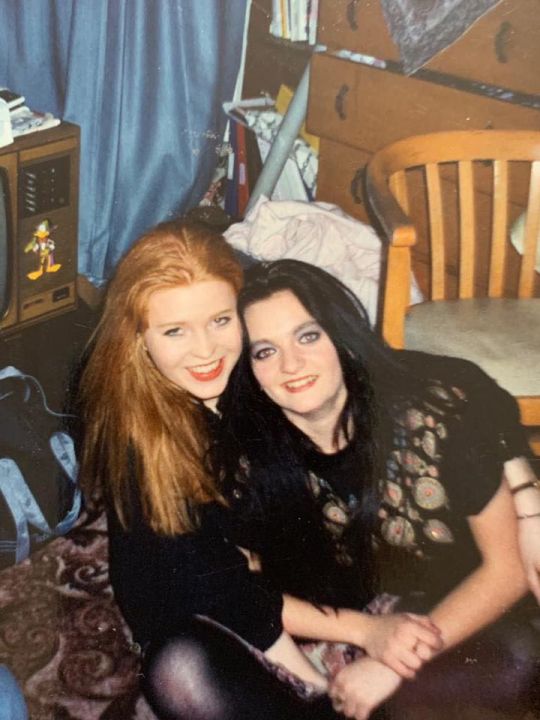
Before Wayne Hussey came over for his tour last year (Nov 2019) Omnibus had provided me with a copy of his book, Salad Daze to review for the rock n roll book club. It is full of great stories about his time with The Sisters Of Mercy and such evocative tales of his childhood. After reading it, I wanted Wayne for a live interview for rock n roll book club, more than I ever wanted anybody. It’s great when I get to interview people that have meant something to me in music. It’s even better when their book is brilliant. I wanted Wayne, for his juicy stories, but mostly for Gillian and our past.
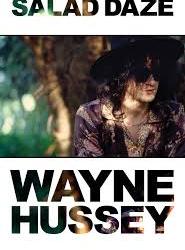
The publisher set it up for November and put us in touch on email. With a date pencilled, I wrote to Wayne and told him of my friendship with Gillian, and how the The Mission was one of the bands we enjoyed together. I told him of how we would sit in her bedroom playing God’s Own Medicine and get up and dance and shove each other about. I told him of the day that Gillian peeled back a small piece of the wallpaper and wrote on her bedroom wall, in biro, ‘I still believe in God, but God no longer believes in me’. We folded the wallpaper back over, so as not to get in trouble. Thirty-five years later, when the house was being cleared to sell, the little quote was still written there, on the wall under the paper.
Gillian and I were best pals for almost forty years. As teenagers we were never out each others houses drinking tea and eating chocolate biscuits and talking boyfriends and school. Once I accidentally broke her kitchen table and my dad came round to fix it. Their house was always full of young teen drop ins drinking out of a stainless steel pot of tea and hanging out with Gillian’s sisters Fiona and Monica, her dad Jim and her mum in a peeny, Gina. For a short time there was also a mad dog, Paddie, he enjoyed everybody’s legs. Gillian and I shared a love of music and were very close. We took trips together to Fort Augustus and slept on Michael and Ronald’s floors. We never thought twice about taking off somewhere with a backpack. I copied her French homework and she borrowed my tapes. When I moved to London she lived around the corner for a while. We were steeped in history and hilarious memories that carried us through a lifetime. When she lived in Manchester she’d send me silly funny notes in the post and I’d do the same. When she moved back to Edinburgh we would phone each other and sing The Mission and Lloyd Cole and The Smiths down the phone. She was cement for me and I for her. Although far apart saw each other whenever we could. We phoned each other a lot and just became kids again.

She was, in fact, best pals with so many people. Her little sisters, Fiona and Monica, and our other pals, Jacqueline, Elaine, Caroline, Babs, Sharron, Lorna, all of her school mum pals, all of her cousins, all of our school friends, the boys from the Academy. Anybody she touched in life instantly loved her. Even foreign exchange students and pen pals kept in touch. Like her mum, she had an abundance of love that beamed out from behind an apron. She was generous, loving, intelligent, loyal, hilariously funny and strikingly beautiful; and she was always, ALWAYS, making tea. She had a glow about her; an energy of positivity, youth, mischief and fun. Everybody had adventures with Gillian, and I was lucky to be one of them.
In Spring 2018 we received a text out of the blue saying that Gillian had been diagnosed with bowel cancer. When she was diagnosed my first thoughts were of how young she was, only in her forties, and how they would definitely operate. She had no symptoms. It was just there. As time moved on she discovered it was incurable and six months later she was gone. I got to spend some time with her in her last days in the Western General Hospital. I took in photos of us to look at and the old things we used to do. We laughed, even though she was in excruciating pain. I have never seen somebody in such pain, she couldn’t stay still despite every powerful drug available being dripped into her body. But still she laughed and smiled. ‘No greeting!’ she said, ‘You’ll get me going.’ I treasure those last few days, but forever feel useless and confused because there was nothing that could be done. I couldn’t save her. Nobody could. It is a powerless, rock hard and impossibly raw feeling to accept.
When Wayne Hussey sent a nice gentle reply to my email I just burst into tears. Because I wanted to phone Gillian. There’s a second when, although you know a person is dead, you get some news that relates to them, and you go to dial their number, and the crash of remembrance is overwhelming. The realisation that I couldn’t tell Gillian first was devastating. I wanted to hear her high excited voice. ‘Oh my God! What you gonnie wear?’ I wanted to smile through the sore tears. She deserved to be here; she deserved to meet him. In those minutes a parallel of our past life and my current life without her smashed together, and I felt lost, empty and just heavily sad. How come I’m here and she’s not?

But Wayne, well, what a gent. Gillian - you would have loved him.

I met with him quite a lot in a short space of time. First for dinner at a Mexican restaurant in Camden with the Omnibus team where I talked rubbish and asked him to sign my records. I had veggie fajitas and kept offering him a bit. He laughed, and was kind and charming. Honestly the nonsense that poured out of my mouth. I composed myself and then interviewed him at The Dublin Castle for rock n roll book club. We could have talked all night. Watch the link, he’s sensational.
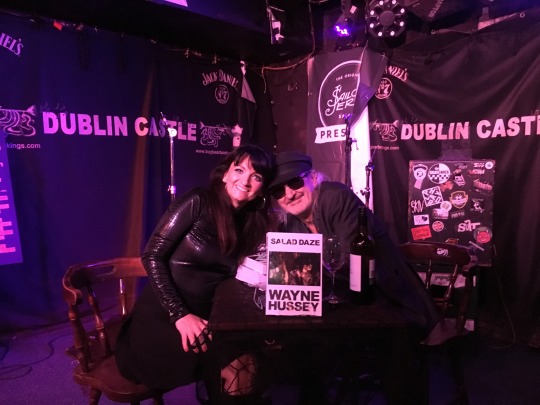
The next morning he came into do my radio show Hamill Time on Boogaloo Radio. We had such a laugh. Wayne is easy to talk to, funny yet professional and quite mischievous. Perfect for Gillian.

I went to his gig in Nambucca that night, which was just brilliant. I felt Gillian beside me. Wayne Hussey’s connection with his crowd is very genuine. He gave me a shout out from the stage. His performance was incredible, authentic and moving. I’m pleased to say we’ve stayed friends.



Gillian, Thanks for sending me Wayne Hussey. I miss you every day. I’m off to listen to God’s Own Medicine now.
Wayne, thanks for reading my books, thanks for all the music and the kindness. You’re the best.
Thanks to David at Omnibus. With love to Fiona, Monica, Jim, Simon and the weans.
In September a fundraising ball was to be held in Gillian’s name to help raise money for Bowel Cancer, but regrettably it had to be postponed. Every day, 110 people are diagnosed with bowel cancer. It can be symptomless, and reach late stages without any signs. Please donate to help fund research. Do something amazing today. You can donate here.
If you can’t donate (times are hard) but you have some wonderful object that would be amazing to raffle at Gill’s ball in 2021, please get in touch. Thank you. X
RIP Gillian Farrell 10 June 1971 - 8 September 2018.
(You and Wayne would definitely have enjoyed a pot of tea and a Caramel Wafer).
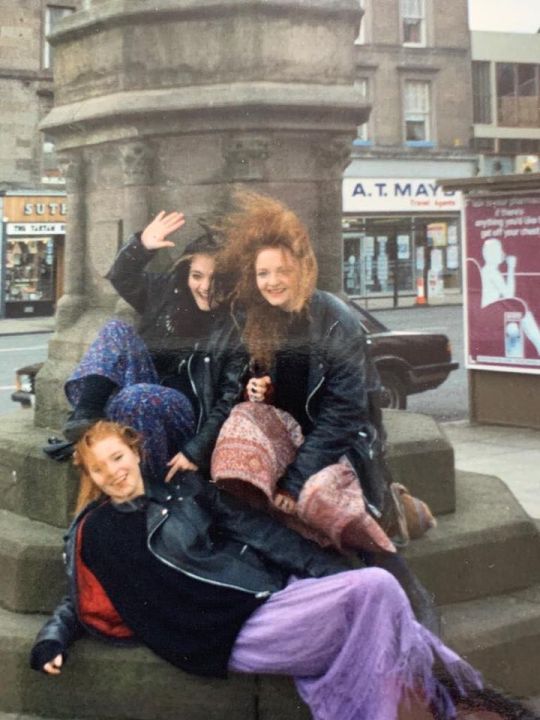
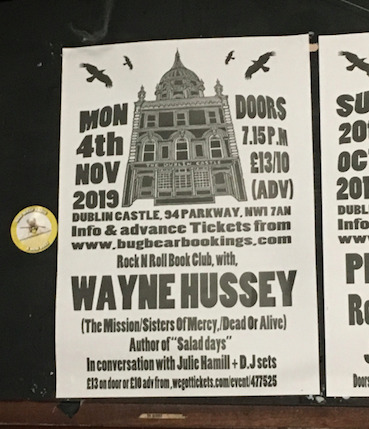
1 note
·
View note
Photo


David Lloyd Clubs - Get a free high-tech assessment providing 14 different body stats.
Come to a place where not one weekend is wasted. Swimming, gyming, lunching, coffee-ing. A yoga class, a knockabout on court, have a mini spa break. A holiday you don't have to pack for. One the whole family can get busy with. Even the littlest ones. And next time you're asked how your weekend was, you'll say, "good". And you'll mean it. Come to life.
With the help of F|D|G - Flyer Distribution Glasgow - https://twitter.com/DeliveryGlasgow/status/864116249181204482
0 notes
Text
Hamlet (1969)
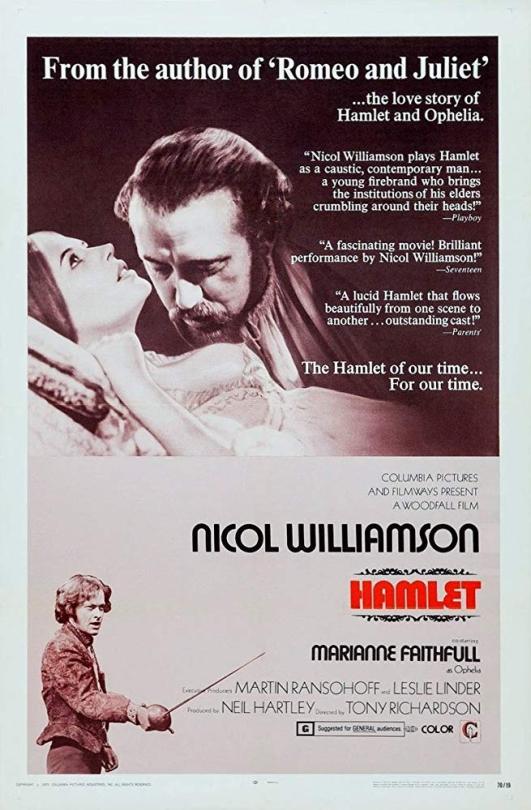
Directed by Tony Richardson
Written by William Shakespeare with an assist from Tony Richardson
Music by Patrick Gowers
Country: United Kingdom
Language: English
Running Time: 117 mins
CAST
Nicol Williamson as Hamlet
Judy Parfitt as Gertrude
Anthony Hopkins as Claudius
Marianne Faithfull as Ophelia
Mark Dignam as Polonius
Michael Pennington as Laertes
Gordon Jackson as Horatio
Ben Aris as Rosencrantz
Clive Graham as Guildenstern
Peter Gale as Osric
Roger Livesey as First Player / Gravedigger
John J. Carney as Player King (as John Carney)
Richard Everett as Player Queen
Robin Chadwick as Francisco
Ian Collier as Priest
Michael Elphick as Captain
David Griffith as Messenger (as Mark Griffith)
Anjelica Huston as Court Lady
Bill Jarvis as Courtier
Roger Lloyd Pack as Reynaldo (as Roger Lloyd-Pack)
John Railton as 1st Sailor
John Trenaman as Barnardo
Jennifer Tudor as Court lady
(All images taken from the Internet. Sorry about that.)
Like many English I have happily accepted every plaudit thrown at the work of William Shakespeare as though I myself had a hand in writing it, while never actually bothering to expose myself to any of it, outside of school anyway. It’s all a bit too much like hard work, you know, got other things to do. This nose won’t pick itself. But in the interests of satiating a mid-life crisis hunger for self-improvement I girded my withered loins and prepared to chuck myself unto the breech of the Bard of Avon’s oeuvre. Being a hesitant creature by nature, I decided to afford myself of the water wings provided by onscreen Shakespeare performed by actors I like. I really like Nicol Williamson (Excalibur (1981), The Reckoning (1969), The Seven Per-Cent Solution (1976) etc) So, here we are then with someone (moi) who is far too late to the party rocking up to tell you about Nicol Williamson’s Hamlet (1969). It’s actually Tony Richardson’s Hamlet starring Nicol Williamson, but in the theatre (darling) to get bums on seats the star gets top billing. In movies this would result in Mark Hamill’s Star Wars, so they don’t do that. And I can see their point because although I know who both Tony Richardson and Nicol Williamson are, I did only come for Nicol Williamson.

No offense to Tony Richardson, mind. Prior to Hamlet he had directed many movies including the cinematic landmarks (deep breath, now) Look Back in Anger (1959), The Entertainer (1960), A Taste of Honey (1961), The Loneliness of the Long Distance Runner (1962), Tom Jones (1963) and The Charge of the Light Brigade (1968). (phew!) Other movies exist in between those, but those are the career makers; most people get one career maker, Richardson had a fistful. Back then though, people obviously had a lot of time on their hands for as well as being a movie director, Richardson co-founded the influential English Stage Company and directed Shakespeare in Stratford-upon-Avon. Crucially though, he also found time to co-found Woodfall Film Productions. Hamlet is of course written by Shakespeare and this movie is a Woodfall Films production. So a Hamlet movie is well within Richardson’s comfort zone. But that doesn’t mean it wasn’t hard work and it doesn’t mean that the fact it works should be taken for granted. Nothing should ever be taken for granted in the world of film. After all Ridley Scott directed Alien (1979) but Ridley Scott also directed Prometheus (2012). And Alien: Covenant (2017). (Could someone please take the Alien franchise off Ridley Scott? Thanks awfully.)
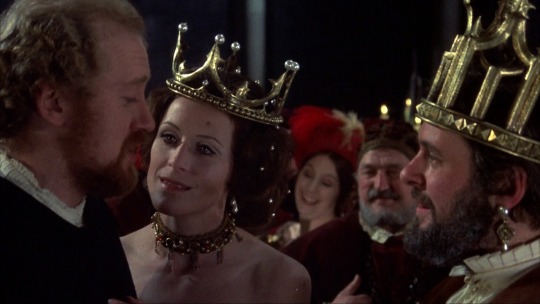
Basically, Hamlet is a good film, well, actually it’s more precisely a really good filmed performance of Hamlet rather than a good film. It’s pretty obvious the budget was what a generous person might term, um, constrained. There’s a lot of stone arches in heavy shadow standing in for Elsinore castle. A lot. Other than this, uh, minimalism it's a pretty meat and potatoes production; with just a soupçon of suggested incest between Ophelia and Laertes and emphasis on generational conflict to add some '60s spice. It's basically Hamlet as written; it's not set on a Glasgow sink estate or in a cupboard in Hitler's bunker. Fret not though, Richardson knows what he’s doing, because the big difference between a performance of Hamlet and a filmed performance of Hamlet is you can get right in there with the camera. And that’s cheap as chips, whereas building Elsinore castle and showing the ghost are not an option. Brilliantly and counter intuitively Richardson takes the opportunity of filming Shakespeare to go not large, not cinematically widescreen in scope, but instead to go small.
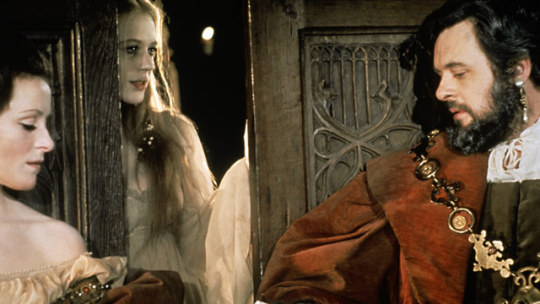
Yes! Nicol Williamson can look you right in the eye as he moodily wonders whether he should off himself. No matter how much your seat cost in the theatre you can’t get that. And every seat in the cinema (or your house) costs the same, so it’s also a great leveller; everyone gets the same view. A ruddy good view at that. You can practically see the pleased gleam in the actors’ eyes as they launch into some riff that has (quite rightly) become part of the linguistic furniture of the world entire. “Oh, sure, you know this one” they seem to say “but you’ve never had it spoken directly to you, and for you alone. Tuck in! fill your boots” Imagine Elvis singing Suspicious Minds to you and you alone. Imagine is all you can do, because he died on the toilet in 1977. But you can actually have Nicol Wiliamson look you in the face and do that one about slings and arrows, even though he died in 2011 of oesophageal cancer.

But Hamlet isn’t just a one-hander, people other than Nicol Williamson are in it. And as fierily magnificent as Nicol Williamson certainly is as the truculent vengeance seeker, everyone else is great. Because, I imagine, if Tony Richardson says he’s filming Hamlet only a berk would turn him down. For there are no berks in sight in this one. One of the fun things about watching old movies of Shakespeare plays turns out to be the familiar delights secreted within the cast. Gordon Jackson, mostly familiar to me as CI5’s George Cowley in TV’s The Professionals (1977-1983) is here as Horatio, Roger Lloyd-Pack AKA Trigger from Only Fools and Horses is here as Reynaldo, Marianne Faithful is, much to my surprise here as Ophelia, and to my even greater surprise, she’s really very, very good (which will teach me to be so presumptuous), Michael Elphick of Boon (1986-1992) pops up and, hey nonny no, who is this playing Claudius, the King usurping uncle? Why, ‘tis none other than Anthony Hopkins, who has been in a couple of things I can’t quite recall right now.
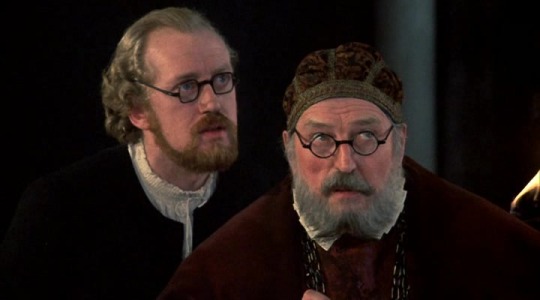
Basically there isn’t a single face onscreen who doesn’t know what they are doing. And that’s why it works as an excellent introduction to Shakespeare. They know what they are doing so while you may not catch all the language (it being somewhat less than modern) you will always catch the gist and the intent of the speech. I’d bet you’d be very surprised by how much you do actually get; you should give yourself more credit. This Shakespeare stuff was never meant for just the toffs, it was meant for you and me; people who want to wind down after work. Don’t let the buggers keep all the good stuff to themselves, yeah?
Now, obviously, the preceding was a) awful and b) not a review of Hamlet itself. I’m not entirely sure who would possess the temerity to critique Shakespeare’s Hamlet (“Shakespeare’s foreshadowing is far too blunt and the whole exercise in adolescent angst is in dire need of a car chase or some boobs to lighten things up.”) What I am saying is, if you feel the need to attempt Shakespeare then you could hardly be in better hands than those of Nicol Williamson, Tony Richardson and ITV’s Boon. Go on, give Hamlet a go. It’s what Old Bill would have wanted.
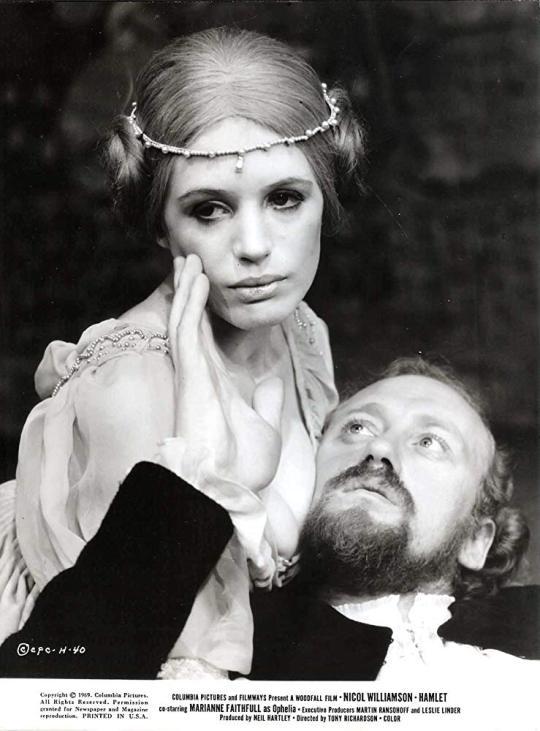
#nicol williamson#tony richardson#anthony hopkins#marianne faithfull#1969#the 1960s#shakespeare#hamlet#gordon jackson#roger lloyd-pack#michael elphick#theatre#culture#highbrow#united kingdom
28 notes
·
View notes
Text
Themes Lately
Sex in the 80s (might have 80s/90s crossovers too).
Erotic 80s film podcast, Pam and Tommy, Heidi Fleiss podcast on LA sex work empires, Columbia Pictures execs / (boys networks) using women, proclivities towards rough sex, cheerleaders, performative/transactional, backlash of 80s pressure groups against social justice movements of the 60s.
I’m having some raging thoughts about sex scandals among Conservatives (in the US and UK) especially in light of the political tide at the moment in the US aiming to restrict female choice over their own bodies.
Mullholland Drive
I like Heidiworld because Molly Lambert covers several topics I find interesting such as subterranean history of LA, LA city planning, LA architecture, female identity, sexuality, rock music and film subcultures, counterculture sociologies, history of vice, links between vice and the film industries, communist purges, seedy aspects of Conservative political classes, hypocrisy of LA police, LA mafia links, OJ etc. etc, 80s/90s cultural shifts, the 2nd generation kids of celebrities/prominent members of the community, Clueless. I realise I just regurgitated many complex subjects I like but this podcast covers these extensively and interestingly, I would recommend listening to it.
Heidiworld mentions how one female escort was abused physically and psychologically and kicked out of a house on Mulholland, which is a remote, scary canyon road. I imagine this experience to be awful and traumatic, experiencing sexual violence with limited access to getting help. Also, a basic point but Mullholland features in the David Lynch film for this reason and it’s got me wanting to re-watch it.
I’m also reading Angelica Huston’s - Watch me autobiography and when she was dating Jack Nicholson initially, he had a house on Mullholland. Angelica liked him in Easy Rider. When they first slept together, he booked her a cab the next day as he had a game to go to, so he said. This seems an emotionally cold red flag, but maybe not.
Incidentally, last week my friend Liz got back from LA and I am so envious, I talked her head off about it. I can taste the air and see the winding canyon roads and desert landscapes. I would kill to go. I would go to the Palisades, Griffith Observatory, Manson family sites, Frank Lloyd Wright houses etc etc.
Parenting style lament
The Heidiworld Heidi Fleiss podcast covers Heidi’s childhood in the 70s and Molly Lambert makes the point that 70s parenting was kind of hands off. This interests me as a couple of GenX people have said this to me - that they thought their parents had checked out. There were broader sociological factors influencing things as well - strikes, recession, higher divorce rate, naming of ‘latch key’ kids, perceptions that the 60s permissive social factors had led to an erosion of stricter parenting and structure.
Heidi’s parents are ex-hippies and her Dad is prominent paediatrician Paul Fleiss. They have an arguably casual approach to parenting where love and affection was prioritised over rule making and reprimands for problematic behaviour. Heidi was wilful, going out clubbing, failed exams, she dropped out of school etc, dated older men.
It just got me wondering about parenting styles - whether any in particular are more useful than others, Interesting how approaches to parenting, or behaviourism in general, are shaped by specific societal, contextual factors and on an individual level - as always interactions between the two.
90s themed teen school movie appreciations
She’s all that, Senior Year. A perpetual interest of mine as I like gawky female protagonists becoming sexual and popular, a subject close to my heart.
Hip Ireland
Conversations with Friends, Maria Somerville. Every year I return to my port Glasgow playlist and what I am yearning for is acknowledgement of my ancestry - themes include, the sea, sexuality, fertility, blue/green, mermaid voices, social isolation, the Church, bleak architecture, high rise flats.
W. class childhood
Shuggie Bain by Douglas Stuart made me think about so much about childhood that it was almost painful to read in some places.
Featuring, parental alcoholism, domestic violence, shame, low self esteem, absent fathers, ugly slag men who shack up with slag women, single mums bearing the brunt, feeling unwanted/unloved like you don’t fit in because your dad left, waiting for the catalogue lady coming/underhand way of cementing further debt to people without much, Council House exchange programs - the Utopian dream of a better life, homelife affecting studies / giving a sheer iron will to want to succeed, other relatives’ desire to be away.
It’s a book I wish I had wrote and it brought me back to when we lived in Glasgow - the colour and contrasts, vibrancy, the bittersweet love/desolation, sectarianism, community/anger/violence, cycles of addiction, massive access to education/social deprivation, jealousies/grievances, wins/losses, abundance/absence.
Dan and I have so much in common with w.class Glaswegians it’s unreal and it’s no wonder we gravitated up there 2016-2020, like homing pigeons, aye.
One thing about Glaswegians is that they have good chat. I’ve never met a boring one! They also judge your level of chat extensively, so you better be ready to bring it and not be a wee boring cunt.
1 note
·
View note
Photo

THE 25TH ANNUAL PUTNAM COUNTY SPELLING BEE Drayton Arms Theatre 29 May - 16 June 2018 ★★★★★ ‘Sharp, funny, slick and humane, if only all days in class could be this life-enhancing.’ Watching high school kids spelling words out loud may sound like watching paint dry but THE 25th ANNUAL PUTNAM COUNTY SPELLING BEE proves there’s joy in the most unlikely of settings. A Broadway hit in the 2000s, it’s a musical about 10 geeky kids competing for the prize in the title, with three pretty equally geeky adults supervising. One of the twists is that four of the kids are randomly pulled from the audience, and it’s no spoiler to say that none of those will be making the final three. It’s sweet, it’s funny and, for all its sly references to the shady pasts of the teachers and imperfect homelives of its often hot-housed children, it’s thoroughly warm-hearted, too, as the competing kids find enough in common to make them friends of an awkward sort. MKEC’s production hits loads of high notes with some superb comic timing from its ensemble cast and a few topical gags thrown in (one kid is asked to spell Windrush, and the definition is worth waiting for). It’s quick, inventive, and a brilliant use of the small but versatile space the Drayton Arms has to offer. And the songs are fun, too (any musical that can rhyme Nietsche with Cristina Ricci is doing something right). On press night at least, the piano, though well played, was too loud for all the cast to be heard above it, but there isn’t a weak performance on the stage even if the singing honours go to Rona Lisa Perretti as the head-mistressy compere and the acting ones to Lottie Johnson as a relentlessly cheerful and energetic Logan and TJ Lloyd as the slobby genius Barfee. The music, in truth, isn’t that great or distinctive, but the lyrics and book are terrifically funny, and it’s impossible to get through the first 10 minutes without laughing out loud. Sharp, funny, slick and humane, if only all days in class could be this life-enhancing. Photo credit : ALEX HARVEY-BROWN at SAVANNAH PHOTOGRAPHIC THE 25TH ANNUAL PUTNAM COUNTY SPELLING BEE Music and lyrics by William Finn Book by Rachel Sheinkin - Conceived by Rebecca Feldman Director/choreographer Adam Haigh Presented by MKEC Productions Drayton Arms Theatre 29 May - 16 June 2018 Box Office: thedraytonarmstheatre.co.uk. Reviewer David Weir’s plays include: Lions of England (Powys Theatre, Newtown, 2018), Confessional (Oran Mor, Glasgow, 2017), Better Together (Brockley Jack, London, 2016), No Occasion To (Hayman’s Theatre, Perth, Australia, 2015), Music from a Distant Shore (Apollo Theatre, Newport, Isle of Wight, 2014), Bitter Looks (Brockley Jack, 2012) and Murdering the Truth (Greenwich Theatre, London, 2009).
#THE 25TH ANNUAL PUTNAM COUNTY SPELLING BEE#Drayton Arms Theatre Spelling competition MKEC Productions Review
4 notes
·
View notes
Text
Juniper Publishers- Journal of Physical Fitness, Medicine & Treatment in Sports The Fall of the Glasgow Rangers: Ethical Ramifications and Lessons to be Learned
Introduction
In 2012, shockwaves were sent through Scottish Football when Rangers FC owner Craig Whyte formally filed for the club to enter administration, during a court battle over a tax bill owed to Her Majesty’s Revenue and Customs (HMRC) totaling £49million, including penalties from failing to pay tax previously 1. This tax bill Rangers faced arose from a row under previous owner David Murray, in which it was discovered that Murray had been using Employee Benefit Trusts (EBTs) between 2001 and 2010 to pay his players’ and staffs’ wages. HMRC argued that Rangers had managed to avoid paying substantial amounts of tax whilst using this scheme. This decision made by Craig Whyte left Rangers fans confused and concerned as to what would happen to their club and left fans of other Scottish clubs concerned about the future of Scottish football without one of the biggest clubs. In June 2012, a Company Voluntary Agreement set out by new prospective owner Charles Green was rejected by HMRC which left Green to buy Rangers’ assets and form a new company, whilst liquidating the old business and confining Rangers to the lowest tier of professional Scottish football, the fourth-division (League Two).
Many fingers can be pointed at Craig Whyte as the reason for Rangers’ financial failure. Whyte’s contribution to Rangers started in May 2011, when Murray sold his 85.3% share to Whyte for £1, believing that Whyte could invest deeply in the club and stadium, as well as sort out another tax case the club had faced during the time, worth around £2.8million. In order for Whyte to pay off the tax liability, and to invest in the future of Rangers, he borrowed £26.7million from Ticketus, against the next three season ticket sales; Ticketus then launched its own legal battle with Rangers and Whyte in order to receive this money back. Whyte’s history had begun to be found out more after he became involved with the club, as it was acknowledged by Rangers that Whyte had been banned previously as a company director, and then further investigations by the Scottish Football Association found that Whyte was not ‘fit and proper’ to run a football club. Murray also states that he regrets the sale of the club to Whyte, stating that, if he had known more about him, the sale would not have gone through.
Sir David Murray must also be in consideration for the blame for Rangers’ demise, due to the massive financial crisis he left the club in. Under his ownership, Rangers was hugely successful with Murray’s extravagant spending; however, this led to the club reporting massive debts and large annual losses during this period. Rangers even reached a net debt of £82million in 2003 during the peak of Murray’s ownership. Fans did eventually realize the cost this success meant for Rangers, as, in 2009, they urged Murray to sell his share in the club, with Lloyds Banking Group looking to recover debts owed to them, which were estimated to be £25-£30million. Walter Smith, manager of Rangers at the time, even said that effectively Lloyds Banking Group was in charge of the club’s spending, which also meant uncertainty involving the future of the club’s players.
Rangers’ demise has not gone unnoticed; one of the most successful football teams - in terms of trophies - failed and collapsed despite assurances from many influential figures that the club would be safe. Players and staff were left facing uncertain futures and supporters left potentially having no team to support. This article looks into how (un)ethically Rangers acted during this period and how the club’s owners’ actions, preadministration and during administration, effectively pushed a financially sinking ship underwater.
Foot Note
1This article is an extended version of an essay submitted for the module Business & Professional Ethics by the last five-mentioned authors in 2017-18. The module was taken by these five students so as to fulfil the requirements of the Accounting Honours programme at the University of the West of Scotland.
Justice
Justice, according to the Cambridge dictionary [1], is the fairness in which people are dealt with. By using tax avoidance schemes, Rangers Football Club gained an unfair sporting advantage and therefore acted in an unethical manner. So, it must be considered whether the company was punished fairly for acting unethically and whether the company was punished in line with other football scandals that happened previously.
As Rangers was punished for tax avoidance, it is necessary to look into the punishments that have been handed out in similar cases. Any company that uses understatement or concealment can be punished by up to 200% of the tax due. This includes companies which move money to secret bank accounts and companies which use false contracts to facilitate paying less tax [2]. In fact, the penalties for tax avoidance can be as severe as lengthy prison sentences, as occurred in various cases in 2016. For example, four men were sentenced to a total of 29 years for falsely inflating company expenses by more than £275million. In another case, two men were sentenced to a total of 19 years when they fraudulently claimed more than £5million in gift aid payments [3]. Therefore, it can be seen that the punishments for tax avoidance can be very serious and severe.
The ethics of Rangers’ collapse are very similar to that of Enron, as that company’s collapse had huge financial implications for its staff and the taxpayers. The case of Enron occurred in 2001 and it is still one of the most famous cases of tax avoidance in the world. Enron had grown to become one of the largest companies in America and this was partly due to the fact that it was using Mark to Market accounting procedures, whereby the company would measure the value of an asset based on its current market value rather than its book value. Enron would transfer any losses to its subsidiaries, allowing the company to look more profitable [4]. It was found out that the company had paid no income tax between the years of 1996 and 1999, which, although not explicitly illegal, was still highly unethical [5]. As the company went into bankruptcy, most of the company’s staff members were unable to sell their shares because of 401K restrictions, leaving many of them without life savings [6]. However, what is different about Rangers’ situation is the fact that none of the directors has been sentenced to any prison time. Therefore, in that sense justice hasn’t been done. Although Enron had much higher debts than Rangers, the comparison is still relevant as both companies cheated the taxpayer.
Rangers Football Club also acted unethically in a sporting sense and did not act with sporting integrity. Rangers used Employee Benefit Trusts to pay players in loans rather than in pay, thus avoiding tax, with Chairman David Murray claiming: “It gave us an opportunity to get players that we perhaps would not be able to afford” [7]. The company incurred significant debt in this period and made losses of tens of millions of pounds year on year. Rangers was able to win various trophies, with players that it couldn’t afford and in doing so gained an unfair advantage [8,9].
Again, to conclude whether justice has been served, it is necessary to look into other football scandals and observe what punishments were handed out in those cases. One of the most famous cases was the Calciopoli scandal, which happened in Italy in 2006, where several top Italian clubs (including Juventus) were found to have been fixing matches by selecting referees who would be favorable in their decisions. Juventus used this method in a match between themselves and Lazio which had championship significance at the end of the 2005/06 season; the referee in charge was known to be favorable towards Juventus. Boeri and Severgnini [10] suggest that, if the referee was not favorable towards Juventus, then he would not be selected for other important matches again where the referee payment is higher. As another aspect of the scam, players in other matches not involving Juventus would be wrongfully dismissed so that they would be unavailable to face Juventus. Several other clubs found to be guilty of this scam, AC Milan and Fiorentina, were both deducted points for the following season and were demoted to the second tier. Juventus had the exact same punishment but was also stripped of its 2004/05 and 2005/06 titles [11].
The Calciopoli scandal was huge in terms of worldwide football with important clubs being involved, but the case of Gretna Football Club is perhaps equally important as what happened took place in Scotland with the Scottish Football Association (SFA) presiding over the punishment. Gretna was a small club which came from playing in the non-professional Unibond League in England to represent Scotland in European competition within a matter of six years. With the financial backing of millionaire Brooks Mileson, the team had three successive promotions and took its place in the final of the premier cup competition in Scotland, before representing Scotland in the Uefa Cup. However, as Mileson took ill, the finances of the football club began to crumble with the club eventually being liquidated. The newly formed club, based in the town, had to start from the very bottom as Gretna 2008 [12]. It presently plays in the Lowland League, which is the fifth tier of Scottish football.
Both of these cases are significant for the Rangers’ situation as the punishments that were handed out to the Italian clubs and to Gretna were not handed out to Rangers. Rangers FC has not been stripped of the trophies that it won in its period of gaining an unfair advantage and it was not automatically demoted to the lower divisions (below League Two). In fact, every club in Scotland was given the right to vote as to whether the new Rangers club should remain in the top division after its liquidation [13]. One could argue that, had Rangers been allowed to stay in the top division (the Premier League), it would not have been punished at all for its wrongdoing.
Therefore, although the use of EBTs by Rangers was not illegal, the practice still allowed Rangers to attract a higher calibre of player than it could have otherwise afforded. Furthermore, the use of EBTs has subsequently been outlawed to stop other companies using them. Rangers cheated the taxpayer and many creditors out of millions of pounds and therefore it was hugely unethical behavior. The question as to whether it was punished fairly is harder to answer. But, by looking at the evidence for tax avoidance and the punishments handed out in the previous footballing cases, it could be argued that Rangers was not punished in line with the standards that had already been set.
Ethics of Care
The two moral demands placed by the ethics of care theory within a business setting are:
a) Preserving relationships with all stakeholders; and
b) Exercising special care with the stakeholders by attending to their needs, values, and desires.
And within these there are four elements of care ethics as noted by Tronto [14];
a) Attentiveness - the requirement to recognize stakeholders’ needs and to respond to them;
b) Responsibility - although ambiguous and not the right of obligation (situation where a reaction or action is due), it does however allow for ebbs and flows between gender roles and class structure, that ties responsibility to those befitting the roles;
c) Competence - to provide the necessary care, not to simply acknowledge it but to accept responsibility to provide it; and
d) Responsiveness - another method to understand vulnerability inequality by understanding what has been expressed by stakeholders.
When asking how an institution such as Rangers could end up in liquidation, we have to look at the ethical dilemmas faced by this and ask if all was done to protect the stakeholders within the company. Rangers had been carrying debts to fund its success and ambitions and, while trying to maintain these, it ran into serious tax problems resulting from the payments of employees through EBTs, of which over £50million back tax was due; this resulted in the current process of liquidation being carried out.
Stakeholders within a football company can be split into two groups:
a) A group that is primarily concerned with the ability to provide success with no emphasis placed on sustainability (fans etc.); and
b) A group that is concerned with the club as a business and its ability to continue as a profit-making entity (this includes shareholders, directors, employees from playing staff to administrative staff, creditors etc.)
When looking at the collapse of Rangers, the ethical questions posed to these two different groups of stakeholders will have differing answers. It can be argued that the ethics of care was initially provided to this first group of stakeholders as the main focus was on the success of the club (Attentiveness to the fans’ wants and needs). Enabling the club to obtain far superior players is giving the fans what is required to be able to provide the success, but then you have to question the price to be paid.
Inevitably, the use of EBTs and subsequent tax demands, which led to liquidation, eventually breached the care duty owed to the fans (Responsibility, Competence, and Responsiveness) as a result of the death of the club (the club-versus-company debate is one for the legal teams of HMRC to sift through); the ethic of care was breached by the directors, owners, and shareholders in that respect due to their decisions in allowing the club’s finances to be perilous, and leaving the fans with an inferior team languishing in the depths of the football leagues with very little opportunity to increase revenues and become successful. So how could the club have acted morally and ethically to provide the care to maintain a sustainable business? Well, the main issue would have been to operate within its financial limits, with the addition of playing staff and their remunerations being within financial constraints and also being legal within the tax system.
Deontology
Deontology is an ethical theory that uses rules to distinguish right from wrong. It is based on the work of the famous philosopher Immanuel Kant, who believed that ethical actions follow universal moral laws. These laws dictate where the ethical limits stand and simply require that people follow the set rules and do their duty. The theory does not require weighing the costs and benefits of a situation because, unlike consequentialism, it does not judge actions by their results and therefore avoids uncertainty and subjectivity. However, there is also a significant limitation in following deontology, which is the fact that many people find it unacceptable. A classic example illustrates this point: suppose an engineer learns that a nuclear missile is about to launch and start a war but he has the skills to hack the network and cancel the launch. Although breaking into any software system without permission is against the employee professional code of ethics, letting the missile launch will lead to thousands of deaths. According to the theory, it is right not to violate this rule; however personal moral values may dictate the person to act otherwise.
In the case of the liquidation of the world-famous Rangers Football Club, a breach of ethical codes happened. The road to disaster started in 1988, when Sir David Murray, one of Scotland’s greatest self-made businessmen, bought Rangers and instantly pumped the football club with money. The 1990s turned out to be very successful for Rangers, with just a few minor voices expressing their worry and concern about the road being taken by the club. The owner was wealthy and this wealth was very much built on debt. Murray never worried about bearing hundreds of millions in debt, viewing the problem instead as a necessary stepping-stone to greater rewards. However, it was soon proven that Murray overestimated the amount of debts which he could bear.
At the beginning of the new century, Murray decided that the club required urgent maximization of resources, which steered the club down a path of tax avoidance. Between 2001 and 2010, the club’s top players were remunerated via EBTs, which, according to the law, implies that employees are supposedly loaned rather than paid. As a result, he managed to escape tens of millions of pounds through the scheme. Nevertheless, this soon triggered a chain of events, which led to HMRC pursuing the club for unpaid taxes. Since then, Rangers has twice won its tax dispute with the authorities, as the gap in the regulation that Murray has found resulted in the club being found to have stayed within the law. Nevertheless, the scandal led to the club’s ambitions being squeezed and Murray wanting an exit.
However, selling Rangers became a problem, due to the fact that few wanted to buy the club because it might possibly have had an unpaid tax bill of tens of millions. It took over three years until a buyer was found, allowing Murray to leave the scene. Craig Whyte bought the club for the price of £1, promising major changes. But these changes never happened, and the club continued to cease to pay tax and build up debt. The road to destruction ended in 2012 when the club’s creditors’ agreement failed and Rangers was consigned to liquidation by HMRC.
Coming back to the example of a software engineer who had a choice of preventing a nuclear war or following professional code of ethics, it can be concluded that, in the case of Rangers Football Club, the owners decided to launch the bomb, and they did this continuously. Murray’s ideology reflects the fact that he has viewed debt as a means to success and tax avoidance as a way to prosperity. Although he followed his own set of rules, he could not foresee the danger of his actions and the outcomes they were leading to. If he was more concerned with the potential results, in line with consequentialism theory, he would be in a position to measure the advantages and disadvantages of his decisions, which would perhaps have led to different and more responsible actions. So, although following the rules makes deontology easy to apply, it also means disregarding the possible consequences of our actions when determining what is right and what is wrong.
Utilitarianism
Utilitarianism theory is based on a moral code; acts should be judged as right or wrong based upon their actual consequences [15]. Everything else achieved is only good or bad according to its tendency to produce happiness or unhappiness. Individuals using this theory consider an action to be right if it maximizes the overall wellbeing of society and wrong if it does not. Businesses applying utilitarianism will engage in activities that increase their profits while, at the same time, best serve the interests of their customers, community, and the government [16].
Sir David Murray’s running of Rangers defied this moral theory on several different occasions with respect to the customers, community and/or government. Murray’s spending yielded huge short-term gains but was the catalyst for the longer-term problems which Rangers faced. Murray spent amounts of cash acquiring players and paying wages which were unheard of in Scottish football at the time. These assets allowed Rangers to dominate Scottish football during the 1990s. Applying the theory here suggests that the actions were a good thing for the customers (fans) as it brought them happiness when they saw their team take trophies. This hugely benefited the community as with large wins comes in large revenues and Rangers could employ more locals in their area of Ibrox; these wins were also beneficial for the taxman for increased revenue equals increased corporation tax. However, this was a dangerous cocktail of success as it led Murray to state that “for every five pounds [arch-rivals from across Glasgow’s sectarian divide] Celtic spends we will spend ten”.
The long-term ramifications were starting to show as, in 1999, the Bank of Scotland secured a floating charge over the club; two years later Rangers’ debt stood at £50million. It was around this time that Rangers employed EBTs. While these were technically allowed, Rangers employed over 80 individual workers on these contracts, compared to Celtic only having one person on this type of contract. Applying the theory, we feel that these EBTs did break a “moral (utilitarian) duty”. This allowed Rangers to avoid taxation and National Insurance for sorely the company’s benefit. This would have resulted in a loss of tax receipts and national insurance for the government; you can see this would be “bad” from the government’s point of view. This eventually affected the community and customers later down the line, as, by September, the taxman had given Rangers a final warning over a £49million tax bill due. This eventually led to administrators taking control and freezing the assets. The damages of the EBTs now hit the fans (customers) as their trust in the club was completely broken. The community was also badly affected by this as Rangers went into liquidation. Ordinary creditors, including small businesses, received nothing while HMRC is still in the process of trying to recover its tax bill.
Conclusion
In regard to ethics of care within a business setting, the lessons that can be learned from these breaches are that directors must stay within a reasonable spending limit, which should be a main objective of all companies. However, within Rangers, reviewing its downfall leads us to believe that its dream of conquering the European Cup was more important to it than were wise restraints on spending. The lesson learnt from this is that, while a company should dream big dreams, those dreams should be acted upon in a sustainable and realistic manner.
In the authors’ opinion, justice was not done in Rangers’ case. David Murray got off relatively lightly; there were no arrests in relation to the tax fraud involving Rangers. To save this happening again, there must be a united front from HMRC and the governing bodies that make the rules for football. Rangers’ punishment did not fit the crime; even though it was demoted in the league, it climbed relatively quickly to be one of the biggest clubs in Scottish football again. In our opinion, we could make a case for Rangers to be stripped of name and history as a deterrent to other football clubs. History is an important part of any football club; we feel the stripping of this would be the strongest punishment for any club. HMRC fully restricted EBTs, and the case created a precedent that tax and national insurance must be repaid.
The lessons learned from the ethics we have discussed are quite plain to see. Using utilitarianism, we can see that David Murray’s actions caused short-term happiness in the club; there was no concern for the longer term which ultimately saw the consequences of these actions cause more unhappiness than good. A strong ethical duty must be the backbone of a company and instilled from the owner and the board. A further lesson that can be learned is that individual boards of directors must remain independent of the owner; Murray had too much influence and too much power over his board, this led to decisions that were in the best interests of Murray’s dreams and goals but not in the long-term best interests of the club. Decisions, such as the EBTs and financing debt with loans from his other companies, should have been scrutinized by his board more closely. An owner shouldn’t be able to spend what he wants; a club should only spend based on its own revenues and serviced debt, and not based on the owner’s wealth. This is what UEFA is trying to achieve with its financial fair play rules.
For more Open Access Journals in Juniper Publishers please click on: https://juniperpublishers.com
For more articles in Journal of Physical Fitness, Medicine & Treatment in Sports
please click on: https://juniperpublishers.com/jpfmts/index.php
For more Open Access Journals please click on: https://juniperpublishers.com
0 notes
Text
Of course the Torchwood panel at Glasgow ComicCon is on the day after I go whyyyy.
On the plus side, on the day I go I've got a photo ticket with Gareth David-Lloyd! Can't wait to meet him!
#torchwood#gareth david lloyd#ianto jones#mcm comic con#mcm comic con Scotland#glasgow comic con#scotland comic con#janto#comic con#fandom
2 notes
·
View notes
Video
youtube
Multi-talented Singer Songwriter Eric Woolfson was born in Glasgow March 18th 1945.
Woolfson was born into a Jewish family in the Charing Cross area of Glasgow, where his family owned the Elders furniture store. He was raised in the Pollokshields area on the south side of the city and educated at the High School of Glasgow.
Eric had an uncle in Glasgow who played the piano masterfully and who inspired Eric to want to become a musician. After a very short spell of piano lessons which were soon abandoned, Eric started playing by himself and became a self-taught pianist who never was able to read music!
After a short spell as a trainee accountant he moved to London to earn his fortune, hanging out in Denmark Street aka Tin Pan Alley, home to the burgeoning music scene in the early 60's. He managed to get work as a session pianist and worked with musicians such as Jimmy Page and John Paul Jones who went on to form Led Zeppelin. After a meeting with Rolling Stones manager Andrew Loog Oldham, who declared him "a fucking genius" Woolfson went on to write songs for Marianne Faithful, Frank Ifield, The Tremeloes, Marmalade, Dave Berry, and Peter Noone. In the 60's he also worked alongside composers and lyricists such as Andrew Lloyd Webber and Tim Rice.
In the 70's he tried his hand as a record producer, the Equals (Eddy Grant), Dave Berry and The Tremeloes were amongst the artistes he worked with. Not content with his Eric formed his own management company he saw early success signing Carl Douglas, of Everybody was Kung Fu Fighting fame and Alan Parsons. With the latter he worked with including Pilot, Cockney Rebel, John Miles, Al Stewart and The Hollies. Subsequently, Eric and Alan formed The Alan Parsons Project, the name originally being intended as a working title for their collaborative project. From 1976 to 1987, Woolfson and Parsons collaborated on the conception and lyrics for all ten albums by The Alan Parsons Project, which have achieved worldwide sales in excess of 50 million.
In the 90's Woolfson went on to create successful musicals, taking advice from Lloyd Webber who Eric said, " that Andrew Lloyd Webber was right and that the stage musical was a fulfilling media for a writer like myself."
Eric was married to wife, Hazel from 1969 until he passed away in 2009 after a 12 year fight with cancer, the couple head two children and four grandchildren.
Eric's most successful song was Eye in the Sky, with the Alan Parsons Project, it reached number 1 in Canada, 4, in the USA Billboard 100 and top 40 in various other countries, they sadly never got the recognition they deserved in this country.
Eye in the sky has a very Scottish feel about it, written by Parsons and Woolfson, Eric was lead vocalist and keyboard player, alongside bas player David Paton from Gilmerton Edinburgh, who formed Pilot and played in The Bay City Rollers. On lead guitar was Lerwick born Ian Bairnson, a regular in the groups line up, I'm sure many of you have heard Ian's guitar work, he played the guitar solo on Wuthering Heights, and Glasgow born Chris Rainbow who had a couple of minor hits in the 70's he went on to do backing vocals for acts including Culture Club, Elaine Paige and Toyah Willcox. Rainbow also produced several albums for Runrig.
9 notes
·
View notes
Text
I was watching the live stream from MCM ComicCon Glasgow of the panel/interview with Kai Owen and Gareth David-Lloyd.
and Kai talked about Aliens Among Us for a bit (!!!!!!!) and then Gareth added something along the lines, that if we miss Tosh, Owen and Ianto, that Big Finish would still do the normal range releases and special releases and THEN.
THEN GARETH SAID: that he just recently did some more work on Torchwood One with Tracy-Ann Oberman/Yvonne Hartman!!!!!
We are gonna get more Torchwood One stuff??? With Ianto and Yvonne???? HELL YEAH!!!
(BUT, I’m gonna say this here already: I hope that I didn’t misunderstand Gareth, but it didn’t sound like he was referring to Before The Fall, but in fact, to new stuff/ “more” about Torchwood one. And obviously, Big Finish hasn’t announced anything along the lines yet/to my knowledge, which makes me think that maaaayyybeeee Gareth might have slipped or I really did get it wrong, but this is still GREAT NEWS!!)
#I AM LIVING#torchwood#gareth david lloyd#ianto jones#big finish#kai owen#aliens among us#torchwood one#my thoughts about torchwood#yvonne hartman#tracy ann obermann
47 notes
·
View notes
Text
Faux outrage
If Dominic Cummings is so evil and despicable, I’d like a precise explanation, case by case, as to what these people did that made it acceptable.
Tahir Ali MP attended a funeral with 100 others
Kevan Jones MP went to a constituent’s birthday party
Stephen Kinnock MP visited his parents to celebrate his birthday
Vaughan Gething having a public picnic having told the Welsh that picnics are not allowed
Labour MP (was this Tony Lloyd?) travels to Manchester with COVID symptoms
Ian Blackford SNP travels from London to Skye in 11.5 hours to go into isolation. Skye didn’t have the virus before this.
Nicola Sturgeon travelling between 3 premesis
Dr Catherine Calderwood for twice visiting her second home
Eddie Wylie made two trips from Glasgow to his Yorkshire family home to see his wife, each a round trip of around 560 miles
And the above is apart from the Royal Family.
Neil Ferguson for having his married lover round
Nigel Farage travelled to Kent and Dover
Journalists breaking distancing outside of Cummings house, heckling, harassing and providing threats.
Roger Jenrick travelling to his parents from London to Herefordshire and then on to Shropshire
Michael Gove for jogging in the park when his daughter was showing symptoms – not a break of lockdown rules but was unwise
King of Thailand for various outings including flying to Bangkok
Dr David Clark the NZ health minister who drove his family more than 12 miles to the beach
Kyle Walker the Manchester City and England Full Back apologised in April after it was widely reported he held a sex party at his Cheshire home
Moise Kean the Everton Striker hosted a wile lockdown party
Jack Grealish the Aston Villa caption hit another car after visiting friends
Marcos Rojo caused outrage smoking and playing cards with friends
Jose Mourinho held a training session with three first team players
Noel Gallagher travelled to both his homes
Gordon Ramsay travelled from London to Cornwall to go to his second home
Jack and Conor Maynard and Miles Nazaire attended a house party
0 notes
Photo

Progressive & Techno. Rather than make a mix with newer tracks published in the last couple months, I decided to go with older tracks dug up from deep in my library.
ed vedra · VEDRA BY NIGHT 016 | VBN016
TRACKLIST:
Mihai Popoviciu, James Dexter - Sleepless (Original Mix) [Moan]
Ivan Garci - Subdeep (Original Mix) [Epoque Music Electronic]
Matan Caspi - Paranara (Rauschhaus Remix) [Eleatics Records]
Andy MacDougall - Shaman (Dennis Cruz Remix) [Glasgow Underground]
Doctor Dru - Savannah (Original Mix) [Jeudi Records]
Paul Ursin - Blackeys (Original Mix) [Noir Music]
Luca Beni - Dark Tribe (Davide Inglese Remix)
Guy Mantzur & Sahar Z - Survivors Guilt (Ramon Tapia Remix) [Lost & Found]
Alex Deep - 2005 (Original Mix) [Hands Up Records]
Reinier Zonneveld - Transelement (Original Mix) [Suara]
Damian Lazarus & The Ancient Moons, Damian Lazarus - Trouble At The Séance (Kölsch Remix) [Crosstown Rebels]
Danny Lloyd - Arapaima (Navid Mehr Remix) [ICONYC]
0 notes